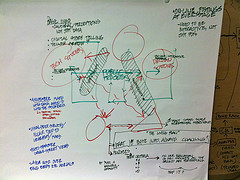Failure. No one likes it, and everyone tries to avoid it.  Unfortunately, it’s been a popular topic of discussion in several tech savvy LinkedIn groups in the past several weeks. People keep asking, “How do I stop a failing IT project?”
Unfortunately, it’s been a popular topic of discussion in several tech savvy LinkedIn groups in the past several weeks. People keep asking, “How do I stop a failing IT project?”
Before a technical manager can figure out how to stop a failing project prevent tears, they first have to understand the seven common reasons a tech project fails in the first place. Once they understand, they’ll be better able to figure out which aspects of their project need the most attention.
Seven Reasons IT Projects Fail
1. Poor Communication
There are countless people involved in any IT project, and keeping the lines of communication open between all of these people becomes difficult. This has negative implications for the project. Poor communication leads to a lack of
– clarity about roles and responsibilities
– understanding of project requirements
– management of project requirements
To make sure that everyone is up to date on the project’s requirements, as well as their role in fulfilling them, communication between all parties needs to be frequent, regardless of their position on the corporate ladder.
2. Can’t Define the Problem
Oftentimes businesses will rush into finding the solution to a problem without really understanding the issue. They often fail to take into account underlying factors that, upon examination, change the nature of the problem.
If you don’t have a good handle on the problem, you certainly can’t find a good solution. You need to understand the business issue from all sides before you can find a solution that will actually improve business practices.
3. Poor Planning
 There’s a saying that goes, “proper planning prevents poor performance.” This is certainly true with IT projects. They need a lot of planning if they are going to be successful.
There’s a saying that goes, “proper planning prevents poor performance.” This is certainly true with IT projects. They need a lot of planning if they are going to be successful.
Unfortunately, a good number of tech departments aren’t patient. They don’t take the time, or enough of it, to sit down and figure out how to accomplish their goals. As a result, their plans are full of problems such as:
– having an improper scope or objective
– failing to factor in enough time or money
A proper plan has rules, processes, tools and software. It errs on the side of caution when estimating, and assigns the right people to the right role in the project.
4. Not Using the Right Technologies
There are two reasons that a project can fail technically:
1. Using something, like a language, that isn’t the best for a project. This often happens because of a team lead’s preference. Make sure that the technology aligns with what’s best for the program.
2. The technologists who are working on the project don’t have the experience or expertise to fulfill their roles. This means that you can’t hand out roles without a lot of thought. Make sure that each person has a role that they are capable of completing.
5. Little Testing
Even if you are testing, you might not be doing enough, doing it well, or doing it at the right time. Without a regular and diligent testing process, that project’s status isn’t going to be visible. As a result, you’re not going to know what’s truly going or how to fix the problems that are arising. Test, test, test if you want to keep your project from failing.
6. Weak Project Management
Your project manager needs to be able to deal with all of the project logistics. They can’t get caught up in one aspect, and drop everything else. They need to be able to
– manage time
– manage money
– lead effectively
– communicate
– measure performance
– make decisions
– understand how to analyze test results and adapt the program as necessary
While this seems to be obvious, projects fail because their manager was not able to balance all of the above. Make sure your PM can handle it.
7. Trying to Make the Project Inexpensive
We all like cutting corners and saving money, right?  It’s great … until your program breaks. Not allotting adequate funds to a project can have serious consequences. Initially underfunded projects come back late, over budget, and are often missing features or have quality issues. The moral of the story? If you want to have it all, you’ll have to pay for it. Otherwise, your project is going to fail.
It’s great … until your program breaks. Not allotting adequate funds to a project can have serious consequences. Initially underfunded projects come back late, over budget, and are often missing features or have quality issues. The moral of the story? If you want to have it all, you’ll have to pay for it. Otherwise, your project is going to fail.
For a project to be successful, you have to plan, implement and test. This needs to be done with communicative managers who realize that cutting corners and saving money will not necessarily lead to the best outcome.
For what other reasons do projects fail? Let us know in the comments section or join the conversation on Facebook, Twitter, or LinkedIn.
Thanks to fireflythegreat and neotint, and 401(K) 2012 for the use of their respective photographs.


